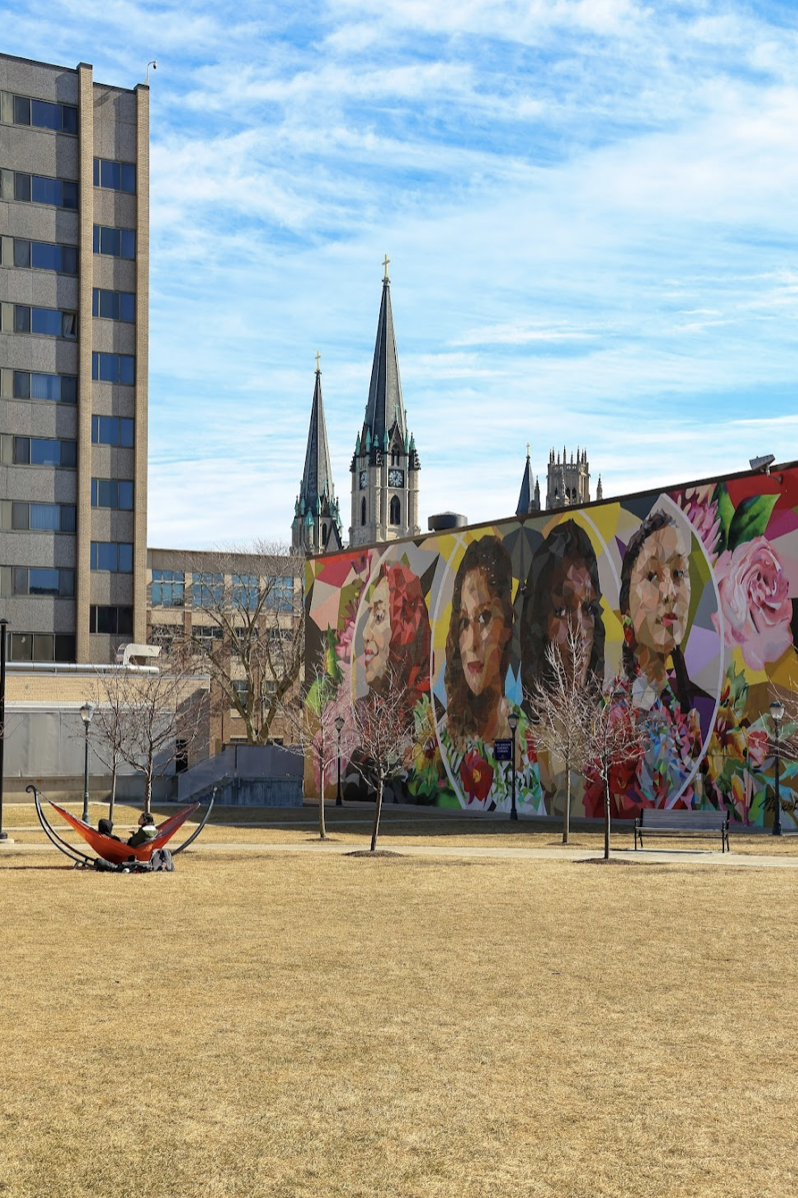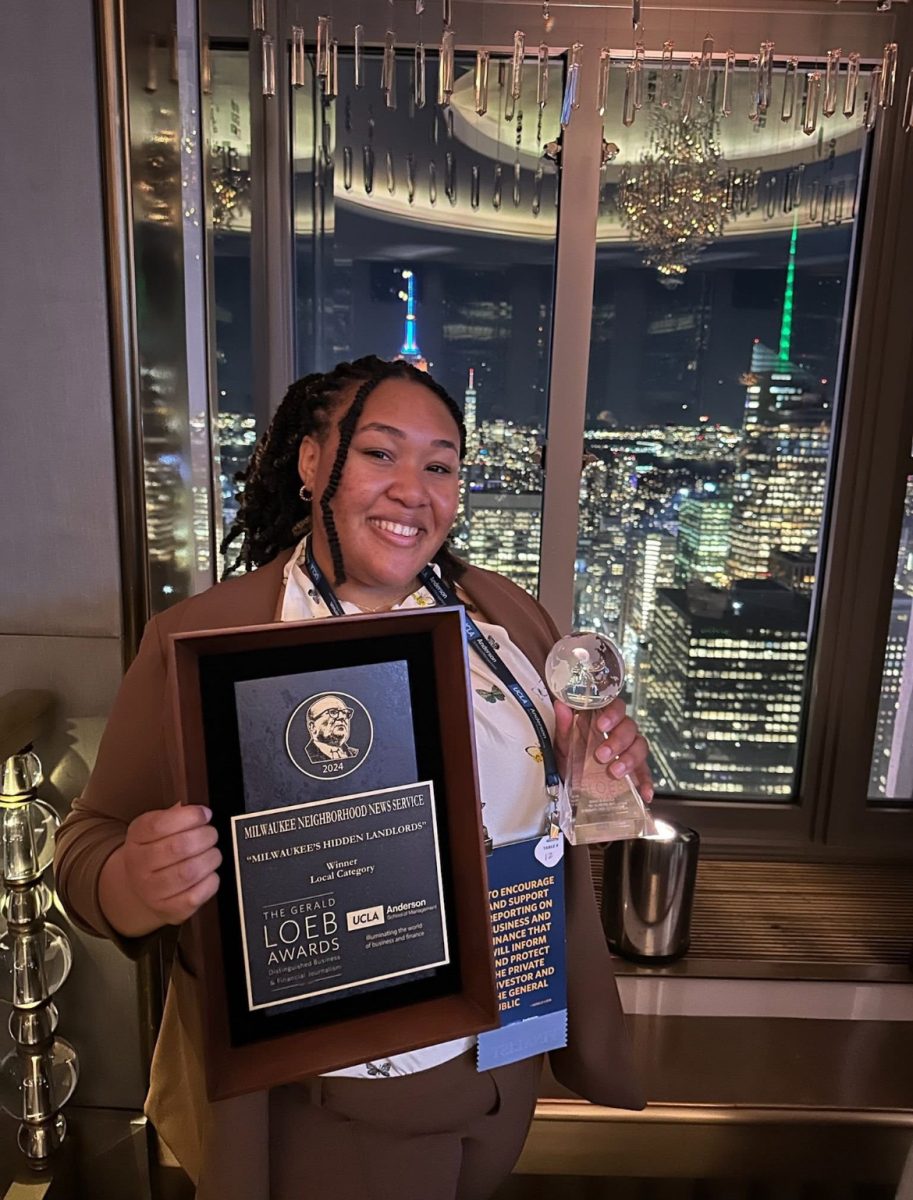By day, they are teachers, cake decorators, moms and wives.

By night, they shift into their alter egos and retreat down a gravel path to their lair — a warehouse half-owned by a casket maker.
No, this is not a sneak peek at the next Marvel superhero flick. It’s just a glimpse of a day in the life of one of the Brew City Bruisers, Milwaukee’s premier female flat track roller derby team, formed in 2005.
Now, for those raising their eyebrows in confusion, let’s take a crash course in roller derby.
This up-and-coming underground sport has been working its way toward the mainstream over the past few years, receiving a recent surge in popularity following the release of the film “Whip It,” which features Ellen Page as a reluctant beauty pageant queen drawn into the world of roller derby.
Roller derby has been around since the late 19th century, when it was simply a more primitive endurance contest. But the sport evolved in the ’70s to focus on athleticism and direct competition, becoming a full-contact sport and implementing scoring procedures.
In a “bout” (derby lingo for a contest), two teams of 20 skate around an oval track. In order to score points, one player — called the jammer — attempts to lap skaters of the opposing team. The remaining 19 skaters then serve as blockers, all trying to keep the jammer from lapping them.
And Servin’ Justice, one of the remaining 14 founding members of the Brew City Bruisers, is pretty good at that.
A 6-foot-tall powerhouse, Justice (who, like most roller girls, uses an alter ego in place of her legal name) lives up to her derby nickname. Since her childhood, Justice has been on skates, thriving in the roller skating trends of the ’80s and ’90s.
“I grew up spending a lot of time with my grandparents, who lived next to a skating rink,” Justice said. “Skating was my life, but then I stopped in my 20s. I came into work one day, and my receptionist had this newspaper on my desk and she was like, ‘You always used to talk about roller skating — look at this, roller derby in Milwaukee!’ So I was like, instantly, ‘Where do I sign up?’”
According to Justice, everybody has their own reasons to join roller derby.
“Some do it for the physical aspect,” Justice said. “Some do it just to get out of the house for a new hobby. Some girls join just to be a roller girl, just to have that stigma, then they realize how serious it is and fall in love with it and become really competitive.”
While roller derby has its health benefits, it also has a plethora of health risks. Justice said Bruisers must endure grueling practices, hard hits, broken bones and other grisly injuries during their tenures as skaters.
“I put my body out there for something that I love, but I do also think, ‘Man, I have a family and a job — I kinda need to pay the bills,’” Justice said.
But enrollment is steady, and roller girls who sustain injuries come back for more as soon as they are recuperated. Fellow Bruiser Carrie A. Hacksaw, for example, is already back on the derby track after undergoing knee surgery only four weeks prior.
“It is an awesome, empowering thing for a woman to do,” Justice said. “They love getting out there and letting out their aggression, taking a bad day and letting it out on the track.”
She said roller girls take pride in their bruises, some even posting pictures of their battle scars on their Facebook pages. After all, they are called the Brew City Bruisers.
The love of the sport is what fuels the Bruisers, a completely skater-owned and operated team. The Bruisers as a whole are composed of four distinct “home teams,” each with their own handmade uniforms, which sport vibrant color contrasts and creative designs to reflect their team names. For example, Justice’s home team, the “Crazy 8s,” was inspired by the Crazy 88 ninja uniforms in the film “Kill Bill: Vol. 1.”
Besides these four teams, which play against each other at home, the Bruisers have an elite team called the All-Stars comprised of 20 from across the four home teams. Justice, a member of the All-Stars, said the team is the Bruisers’ traveling squad.

If all this sounds exciting, be warned: Being a Brew City Bruiser is by no means all fun and games.
To become a Bruiser, skaters (who must be both female and at least 21 years old) must get through boot camp, a monthly open house to see if potential roller girls can handle what weekly practices would be like.
Orientation is held in July for those who made it through boot camp. There, the rules of the league are outlined, including the attendance policy and the emphasis on a strong work ethic. Those who agree to adhere to the rules begin an intense eight- to 10-week training period administered by Justice, which spans from July through Labor Day weekend.
“I work ’em to death and build ’em up because at the end of the day, we are still putting out a product, so I have to get these girls in shape because when we are playing at the U.S. Cellular Arena it gives us more credibility when we perform well,” she said.
That is why they practice two to three times a week, honing their skills by doing drills, modeling various derby scenarios and strategies, and improving their skating techniques.
Since the Bruisers are still a relatively young team, they pay individual dues to rent their practice facility. Some of the team’s costs are subsidized by local sponsors and fundraisers, and the Bruisers also make money from ticket sales and merchandise.
But that is not enough to completely cover all their expenses. Justice said she hopes an increase in the team’s recognition will lead to a day when the Bruisers will not have to pay dues.
The Bruisers next compete with their All-Stars in Green Bay in the “Thunda on the Tundra” Women’s Flat Track Derby Association (WFTDA) North Central Regional Tournament, Sept. 10 through 12. More information on Servin’ Justice, the rest of the Brew City Bruisers, and upcoming events can be found at www.brewcitybruisers.com.





